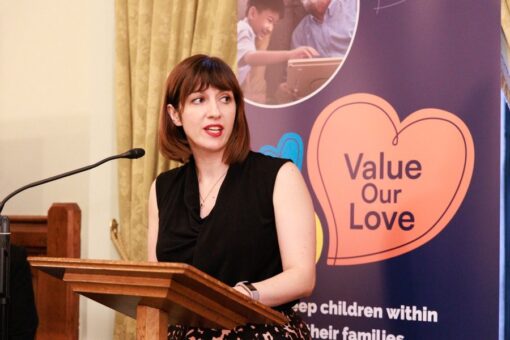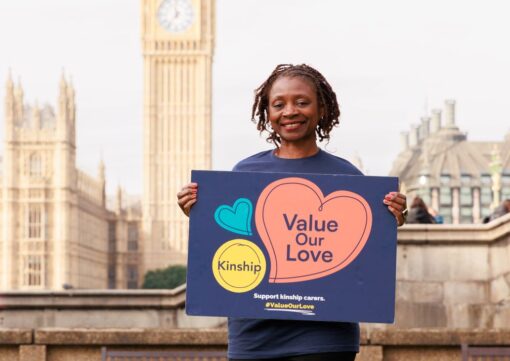
Children in kinship care have been overlooked. Our report explores insights from our 2023 survey to understand how we can improve support for kinship children in England and Wales across education, SEND/ALN, mental health and family relationships.
13 May 2025
Have you heard of the Children’s Wellbeing and Schools Bill?
This government Bill sets out a range of changes to the education system and to children’s social care – including kinship care – in England. It forms a key part of the government’s mission to break down the barriers to opportunity and its first key milestone to give children the best start in life.
Introduced in December 2024, the Bill is currently making its way through Parliament, giving MPs and Peers the opportunity to scrutinise, debate, and propose amendments. Peers in the House of Lords recently had their first chance to debate the Bill’s contents, but only once both Houses have approved a Bill in the same form does it receive ‘Royal Assent’ and become law.
Click on the link below to take you to the section you'd like to read:
The government has previously shared an ambition to roll out reforms to better support kinship carers and their children. The Department for Education set out their vision for the children’s social care system in November 2024 and outlined the steps they wanted to take to “empower family networks and offer secure and loving homes through kinship arrangements”.
Some of these are now being taken forward through the Children’s Wellbeing and Schools Bill, whereas others – including the trial of a kinship allowance announced in the Autumn Budget 2024 – will be delivered outside of this particular piece of legislation. The Bill includes a new legal duty on local authorities to publish a ‘kinship local offer’ to provide clear and accessible information about the services available for kinship families in their local area.
The government’s celebration of kinship care – and the fact this flagship Bill of theirs includes a strong focus on kinship care and supporting family networks – is a testament to all of those kinship carers who have pushed for change locally and nationally. Introducing new legal duties to improve the information provided to kinship carers is welcome progress for Kinship’s #ValueOurLove campaign .
Thousands of kinship carers have lent their time and their energy to support the campaign in recent years, and Kinship for more than two decades. The inclusion of kinship care in this Bill is a positive reflection of the difference we’ve made together.
However, ultimately, the Bill falls short of delivering the vital educational and mental health support which children in kinship care urgently need. The local offer’s impact will be to magnify the lack of support available to kinship families, particularly those with informal arrangements or where a legal order was made in private proceedings.
If you want more detail on our verdict and the Bill's current progress, read our most recent parliamentary briefings on the Children's Wellbeing and Schools Bill for MPs and Peers.
Briefings, responses and submissions
Sound familiar? Don’t worry – you’re not experiencing déjà vu.
The government published new statutory guidance for local authorities back in October 2024. This included a refreshed requirement for local authorities to publish up-to-date and accessible information about the services they offer to kinship families in their area through a ‘kinship local offer’. Clause 5 of the Children’s Wellbeing and Schools Bill effectively ‘upgrades’ that requirement to become a legal duty, strengthening what was already in guidance.
We think this is good news for kinship families. Our evidence has illustrated how local authorities weren’t delivering on the previous requirement – in place since 2011 – to publish a ‘family and friends care policy’. In 2023, only 7% of kinship carers told us they’d ever seen their local authority’s policy.
We hope this new duty will help to improve the poor ratings typically given by kinship carers of their own local authority’s information, but it’s also likely to put a magnifying glass to the unacceptable level of variation in the support available to kinship families depending on where they live, the type of kinship arrangement they have, and the child’s journey into kinship care.
This feels particularly true at the moment given the government’s recent decision to reduce the level of support available through the adoption and special guardianship support fund (ASGSF), at the very same time the Bill seeks to improve signposting to therapeutic support. This confused approach isn’t in the best interests of kinship carers or their children.
We want to see local authorities use the opportunity provided by the local offer to work alongside the kinship families in their local area to improve the financial, practical and emotional support they offer to all kinship families.
Independent information, support and advice for you. Because, we know kinship care is complex and confusing. Use Kinship Compass to discover what support is available to you, both locally and nationally, to help you navigate your kinship journey.
In your area
Stop me if you think you’ve heard this one before too.
As with the kinship local offer above, this is another ‘upgrading’ of something which already exists. Since September 2024, the role of the virtual school head (VSH) has been extended to include championing and supporting a wider group of kinship children, including those who haven’t ever spent time in local authority care.
Clause 6 in the Bill places a new statutory duty on local authorities to deliver this, bringing a more consistent approach to how VSHs are expected to champion the educational attendance, attainment and progress of children in kinship care across the country. Again, we think this strengthened recognition of all kinship children – and their educational support needs – is really welcome.
But we also think the ability of VSHs to identify and support this wider group of children in kinship care is being limited by other missing key elements. Kinship children who aren’t currently or weren’t previously looked after by the local authority still aren’t eligible for pupil premium plus funding, nor are they included in data collected about children’s educational outcomes.
That’s why we’re pushing the government to recognise the similar needs and experiences which kinship children have to those in local authority care, and harmonise the patchwork of educational support available to them. You can find out more about kinship families’ experiences with education and our recommendations in our Forgotten report.

Children in kinship care have been overlooked. Our report explores insights from our 2023 survey to understand how we can improve support for kinship children in England and Wales across education, SEND/ALN, mental health and family relationships.

Pupil premium plus is special funding for schools in England to promote the education of pupils who are or have been in the care of children’s services.
Clause 1 of the Bill looks to place another new duty on local authorities, this one to ensure that all families are offered some form of family group decision making (FGDM) when a child is at risk of entering local authority care. FGDM approaches involve bringing together the child’s extended family network to come up with a tailored plan to help keep them safe.
We think it’s great that wider family members and friends could be involved in decision making about the welfare of a child they love at an earlier stage. Kinship carers tell us all the time that they were only approached to help once things had reached crisis point.
But we’re a bit dubious about the government’s own impact assessment of how they think this new duty might impact on the numbers going into local authority care and into other kinship arrangements. We know that the number of children remaining in kinship foster care is actually growing, at least partly because kinship carers are concerned about the lack of support available to them and their children if they move into other arrangements such as special guardianship.
If the government really wants to reduce the number of children in local authority care, they should ensure that kinship arrangements outside of the care system are equally well supported – financially, practically and emotionally. In the interim, we don’t want to see families pushed down other kinship care routes which might limit their eligibility for support when they really need it, and without understanding the implications.
Finally, alongside the kinship local offer duty, Clause 5 of the Bill provides a definition of kinship care. We’ve seen a similar version before in last year’s statutory guidance, but here is a definition in legislation for the first time.
This definition helps to provide some additional clarity for policymakers and others, and we hope it will improve the visibility of kinship families across government too. However, words on a page aren’t enough to improve the lack of awareness or the negative experiences which many kinship carers face engaging with services and professionals.
In addition, the vast majority of support for kinship carers and their children continues to target more specific groups, such as special guardians or those raising children who were previously looked after. For us, this undermines having an inclusive definition which recognises the similar needs, strengths and experiences of all types of kinship family.
Standing shoulder-to-shoulder with kinship carers as part of our #ValueOurLove campaign, we’ve continued to ensure the views and experiences of kinship carers are being heard by MPs and other decision makers responsible for scrutinising and developing the Bill.
Our policy and public affairs team have also been busy behind the scenes, sharing written briefings outlining our evidence and recommendations to MPs and Peers at every stage of the Bill’s journey through Parliament. We’re grateful to all of those who have spoken in debates and shared their own experiences hearing from kinship carers and #ValueOurLove campaigners in their constituency.
We’ve worked alongside MPs, including Munira Wilson MP, who tabled a series of amendments to the Bill which would have included our key policy asks including financial allowances, kinship care leave, and extended educational support for kinship children. Although these weren’t successful, they forced the government to consider and respond to the proposed changes, and helped raise awareness amongst other parliamentarians.
Our Associate Director of Policy and Public Affairs, Sam Turner, has also given evidence to the Education Committee (a cross-party group of MPs who scrutinise the work of the Department for Education) on the Bill and where the government needs to go further.
"There isn’t a huge amount of point signposting to support which doesn’t exist."
Sam Turner, our Associate Director of Policy and Public Affairs, when giving evidence to the Education Committee on the Bill

We’ll continue to push the government to go further and faster with the Children’s Wellbeing and Schools Bill, working with Members of the House of Lords as their scrutiny of the Bill continues. You can find out more about how we think the Bill could be improved and how the government should deliver enhanced support for kinship children’s education and mental health by reading our Forgotten report or our parliamentary briefings on the Bill.
Although the Bill is an important opportunity to improve awareness of and support for kinship families, there are lots of other opportunities on the horizon too, including some which have the potential to be even more meaningful or significant. In particular, the government should work at pace to confirm the details of its planned trial of a kinship allowance in up to 10 local authorities.
In June, the government’s Spending Review will finish – this process settles the funding available to each government department and influences the key policy priorities they’ll have over the next few years. Our #ValueOurLove campaign will continue to ask the government to use the Spending Review to invest in kinship care, recognising that kinship carers can’t pay for their children with love alone and emphasising the need to set out a long term plan for the future of the adoption and special guardianship support fund (ASGSF).
In the longer term, we want to see the government introduce new legislation which delivers the financial, practical and emotional support which all kinship families need and deserve. It’s good that the government have already recognised that other reform to children’s social care is needed in the future, including additional legislation. We’ll hold them to account here and ensure kinship families are at the forefront of shaping what this is and what it looks like.
You can help – lend your support to the #ValueOurLove campaign and get involved by contacting decision makers, sharing your views, and meeting with your MP. For more information on what’s happening now and what we think should happen next across kinship care policy in England, you can visit our kinship care policy tracker.

Read about our campaign, #ValueOurLove, calling on politicians to increase support for kinship carers and the children they love.
View Kinship's Value Our Love campaign
Learn how Kinship shapes policy and advocates for change. Through collaboration with families and policymakers, we work to ensure kinship carers’ voices are heard and supported across England and Wales.
View Policy and influencingSign up for emails to keep up to date with the information that’s important to you, from support and advice for kinship carers, to our latest news, events and campaigns.